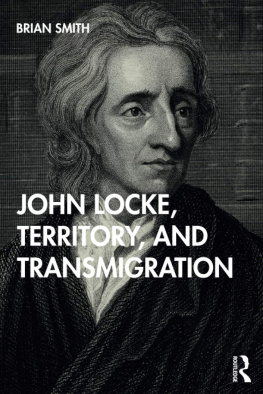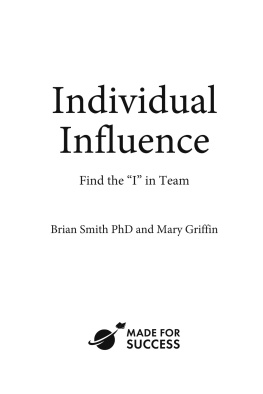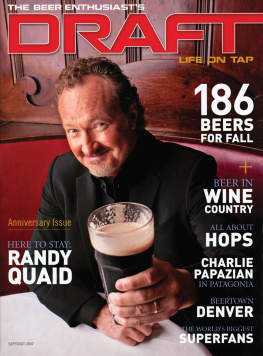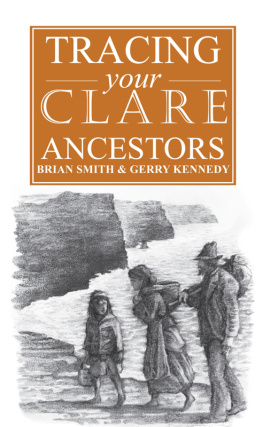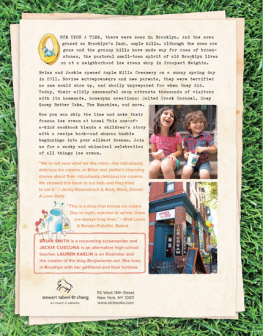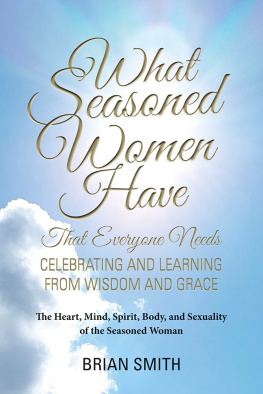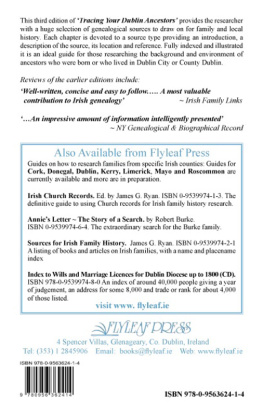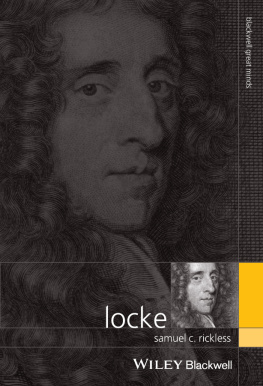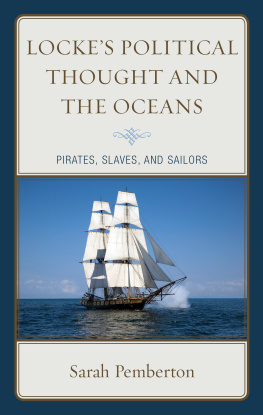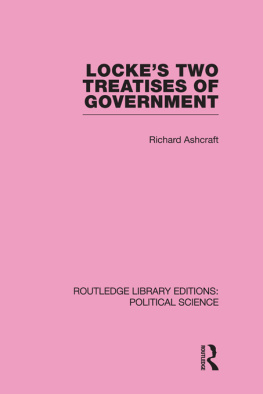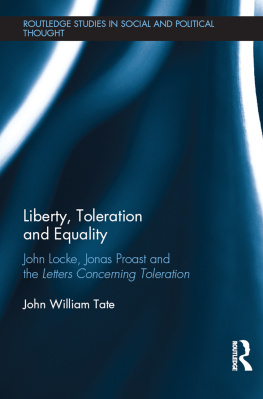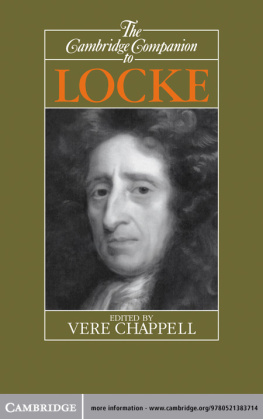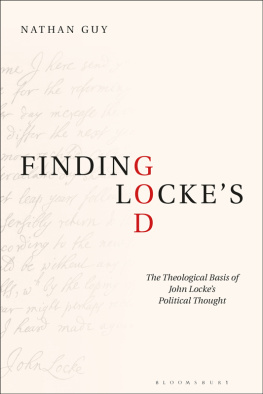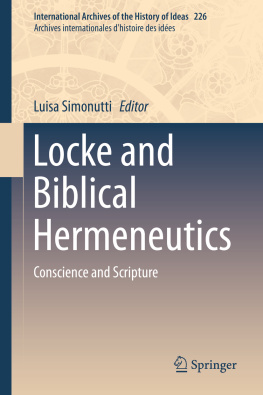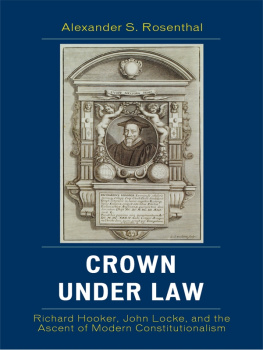John Locke, Territory, and Transmigration
This book examines John Locke as a theorist of migration, immigration, and the movement of peoples. It outlines the contours of the public discourse surrounding migration in the seventeenth century and situates Lockes in-depth involvement in these debates. The volume presents a variety of undercurrents in Lockes writing his ideas on populationism, naturalization, colonization and the right to withdrawal, the plight of refugees, and territorial rights which have great import in present-day debates about migration. Departing from the popular extant literature that sees Locke advocating for a strong right to exclude foreigners, the author proposes a Lockean theory of immigration that recognizes the fundamental right to emigrate, thus catering to an age wrought with terrorism, xenophobia and economic inequality.
A unique and compelling contribution, the volume will be of great interest to scholars and researchers of political theory, political philosophy, history of international politics, international relations, international political economy, public policy, seventeenth century English history, migration and citizenship studies, and moral philosophy.
Brian Smith is Assistant Professor in the Political Science and International Relations Department at Nazarbayev University, Astana, Kazakhstan. He received his PhD in Political Science from Boston University. He works broadly on intellectual history, alternative models of citizenship, and on immigration. His published work can be found in various journals including History of Political Thought, Polity, Citizenship Studies, Science and Society, Locke Studies, Philosophy and Literature, among others.
First published 2021
by Routledge
2 Park Square, Milton Park, Abingdon, Oxon OX14 4RN
and by Routledge
52 Vanderbilt Avenue, New York, NY 10017
Routledge is an imprint of the Taylor & Francis Group, an informa business
2021 Brian Smith
The right of Brian Smith to be identified as author of this work has been asserted by him in accordance with sections 77 and 78 of the Copyright, Designs and Patents Act 1988.
All rights reserved. No part of this book may be reprinted or reproduced or utilised in any form or by any electronic, mechanical, or other means, now known or hereafter invented, including photocopying and recording, or in any information storage or retrieval system, without permission in writing from the publishers.
Trademark notice: Product or corporate names may be trademarks or registered trademarks, and are used only for identification and explanation without intent to infringe.
British Library Cataloguing-in-Publication Data
A catalogue record for this book is available from the British Library
Library of Congress Cataloging-in-Publication Data
Names: Smith, Brian, 1978 author.
Title: John Locke, territory, and transmigration / Brian Smith.
Description: Abingdon, Oxon ; New York, NY : Taylor & Francis Group, 2021. | Includes index. |
Identifiers: LCCN 2020036686 (print) | LCCN 2020036687 (ebook) |
ISBN 9780367344801 (hardback) | ISBN 9780367345587 (paperback) | ISBN 9780429326547 (ebook)
Subjects: LCSH: Locke, John, 16321704Political and social views. |
Emigration and immigration--Economic aspects. | Transmigration.
Classification: LCC JC153.L83 S65 2021 (print) |
LCC JC153.L83 (ebook) | DDC 325/.101dc23
LC record available at https://lccn.loc.gov/2020036686
LC ebook record available at https://lccn.loc.gov/2020036687
ISBN: 978-0-367-34480-1 (hbk)
ISBN: 978-0-367-34558-7 (pbk)
ISBN: 978-0-429-32654-7 (ebk)
Typeset in Bembo
by codeMantra
This book is dedicated to Archie R. Smith Jr. Thank you for all the love and support, grandpa. You are deeply missed.
The issue of immigration always seems to be timely. Pieces of this book started to come together in 2015, under the cloud of multiple refugee crises. The conflicts in Syria and Ukraine and the unrest in Venezuela, not to mention the violence and economic disparities throughout Africa, that ultimately led to numerous migrants making the perilous trip across the Mediterranean Sea were all unfolding. Now, five years later, many millions of people are still displaced and in transit. The continued economic disparities lead one to conclude that both regular and irregular migration will remain a feature of global politics for some time. What it will look like and how states will grapple with this issue are more uncertain today than ever. The global COVID-19 pandemic has led many countries to close their borders. For some unspecified amount of time, global migratory patterns have been slowed, putting many of those in transit in an even more uncertain limbo. This remains pressing, and what is more, the debates about what is to be done have become much more polarized.
This book does not directly venture into these contemporary debates, but it has them in view. As we piece together a vision of what migration will look like and how states will grapple with it, it is important to understand where the arguments we employ come from and how they came to be. In some small way, this project seeks to contextualize the contemporary migration discourse by providing a historiographical account of early arguments about immigration, naturalization, and territorial rights in the seventeenth century, specifically those articulated by John Locke and the contemporaneous traditions he was engaging with. Locke lived in a time where there were successive refugee crises as well as yearly public debates about naturalization policy in fact, the word refugee had just entered the English language in 1685 after the massive influx of French Protestants into England. What is so relevant about Locke and the debates around migration is that they take place at the dawn of liberal thought. This book is not a defense of liberalism, but it does seek to chart the formative arguments that contributed to that tradition. Indeed, in certain ways the arguments in this book represent a forgotten legacy. Many will be surprised to learn that even in spite of concerns about overpopulation, which was a common late-Tutor argument for population control, Whig theorists like Locke routinely argued for the free movement of people. To be sure, many of these quite typical late-seventeenth-century arguments are today written off as radical or extreme. But to Locke and many of his contemporary Whigs, they were the logical extension of consent-based politics and the dutiful adherence to the natural law. It is worth remembering that, according to Locke, individuals are not automatically born with a political affiliation. Citizenship is not ascriptive. People should be able to choose where their political homes will be. Each of us has a fundamental right to seek membership in a country of our choosing. So rather than promoting strict territorial rights where states are actively looking to exclude foreigners with walls and militarized borders, Locke argues that a healthy state, one overseen by a wise prince, will actively seek to admit prospective citizens. People are a nations true wealth.
In many ways, I wrote this book to make sense of the disjunction that exists between the nominal fidelity to the liberal tradition in contemporary politics and the reality of what early liberal politics were. The more proximate origin of this book, however, can be traced back to a provocative question posed to me by Prof. Gregory Fried during my dissertation defense. I had written a series of essays on Locke and the natural law, unrelated to the question of immigration. We had been speaking about certain implications to Lockes colonial thought when Greg asked me if the idea of spoilage might have ramifications for immigration politics in places like the United States. If Lockes argument was that the colonists had a claim to land in America because they would make more productive use of it, then perhaps immigrants might more fruitful employ aspects of our economy which are currently lying fallow. On this view, wouldnt migrants have a legitimate claim to jobs that were simply going to waste?

